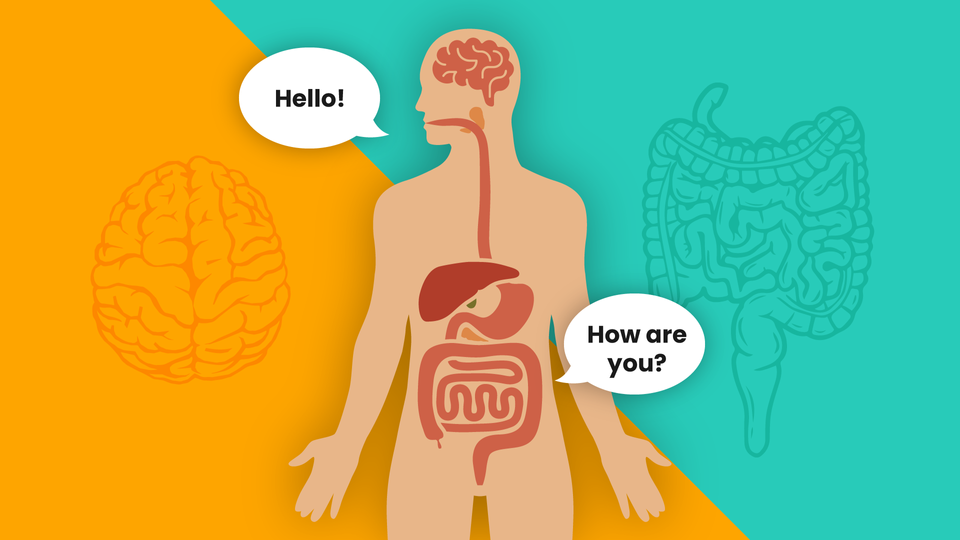From Mood to Food: How Your Gut Microbiome Shapes Your Every Day

The human body is a marvel, a complex system where every part is interconnected.
One of the most fascinating connections is the one between our gut and brain. This relationship, often referred to as the "brain-gut axis," has been the subject of numerous studies and has revealed insights that could revolutionize our approach to mental and physical health.
Microbes and Mental Health:
Our gut is home to trillions of microorganisms, collectively known as the gut microbiome. These tiny creatures play a significant role in our overall health, from aiding digestion to influencing our immune system.
But their impact doesn't stop there. Research has shown that the composition of our gut microbiomes is linked to psychiatric disorders like anxiety, depression, ADHD, and ASD. A shortage of certain gut bacteria has been associated with these disorders.
On the brighter side, introducing specific bacteria types, through probiotics or dietary changes, has shown potential in alleviating stress effects and even symptoms of certain diseases.
Gut Bacteria and Personality Traits:
It's not just about diseases and disorders. The gut microbiome also plays a role in shaping who we are.
Recent studies have found a connection between the diversity of the gut microbiome and various human personality traits. For instance, individuals with larger social networks tend to have a more diverse microbiome. This suggests that our social interactions, lifestyle, and even our mental state can influence the microbial community in our gut.
5 Ways the Gut Biome Keeps Us Healthy:

The gut microbiome, with its vast array of microorganisms, plays a pivotal role in maintaining our health. Here are five specific ways in which a balanced gut biome contributes to our well-being:
1.Digestion and Nutrient Absorption:
- Breaking Down Complex Carbohydrates: Beneficial bacteria in the gut break down complex carbohydrates, such as dietary fiber, into short-chain fatty acids (SCFAs) like acetate, propionate, and butyrate. These SCFAs serve as energy sources for the cells lining our colon and play a role in reducing inflammation.
- Aiding in Mineral Absorption: The gut microbiome facilitates the absorption of essential minerals like calcium, magnesium, and iron, ensuring that our body gets the necessary nutrients from the food we consume.
2.Immune System Regulation:
- Training the Immune System: The gut microbiome exposes our immune system to various microbes, helping it differentiate between harmful pathogens and harmless entities. This "training" is crucial for preventing overreactions, such as allergies.
- Producing Immune-Boosting Compounds: Certain gut bacteria produce compounds that boost the activity of immune cells, enhancing our body's defense against infections.
3.Mood and Brain Health:
- Producing Neurotransmitters: Many gut bacteria can produce neurotransmitters, such as serotonin and dopamine, which play a role in mood regulation, sleep, and appetite. In fact, a significant portion of the body's serotonin is produced in the gut.
- Gut-Brain Axis Communication: The gut and brain communicate through the vagus nerve, hormones, and immune system signals. A healthy gut microbiome can influence brain health and function, potentially impacting mood, behavior, and even cognitive abilities.
4.Metabolic Health:
- Regulating Blood Sugar: The gut microbiome can influence how our body processes sugars and fats, impacting insulin sensitivity and overall metabolic health.
- Influencing Appetite: Gut bacteria produce compounds that can influence our appetite and satiety, potentially playing a role in weight management.
5.Protection Against Pathogens:
- Competitive Exclusion: Beneficial bacteria in the gut can outcompete harmful pathogens for resources, preventing their colonization and growth.
- Producing Antimicrobial Compounds: Certain gut bacteria produce substances that have antimicrobial properties, inhibiting the growth of harmful pathogens.
In essence, a balanced and diverse gut microbiome is a cornerstone of good health. It not only aids in digestion but also plays a role in immune function, brain health, metabolic regulation, and protection against harmful pathogens. Ensuring the health of our gut biome is, therefore, paramount for overall well-being.
Factors That Worsen the Gut Biome:
While it's crucial to understand how to promote a healthy gut, it's equally important to be aware of the factors that can negatively impact our gut microbiome. Here's a detailed look at some of the primary culprits:
Poor Diet:
- Processed Foods: A diet high in processed foods, especially those with artificial additives, can harm beneficial bacteria and promote the growth of harmful ones.
- High Sugar Intake: Excessive sugar can lead to an overgrowth of harmful bacteria and yeast, such as Candida.
- Lack of Dietary Fiber: Fiber acts as a prebiotic, feeding beneficial bacteria. A lack of fiber can starve these bacteria, reducing their numbers.
Medications:
- Antibiotics: While they're essential for treating bacterial infections, antibiotics can also kill beneficial bacteria. It's crucial to use them judiciously and under medical supervision.
- Other Medications: Regular use of certain medications, including proton pump inhibitors, antacids, and even some anti-diabetic drugs, can alter the gut microbiome.
Excessive Alcohol Consumption:
High alcohol intake can disrupt the balance of bacteria and fungi in the gut, leading to issues like leaky gut syndrome.
Chronic Stress:
Prolonged stress can lead to an imbalance in the gut microbiome, reducing the number of beneficial bacteria and increasing harmful ones.
Lack of Physical Activity:
Regular exercise can promote a diverse gut microbiome. A sedentary lifestyle, on the other hand, can lead to a less diverse gut, which is often associated with various health issues.
Inadequate Sleep:
Disrupted or insufficient sleep can negatively impact the gut microbiome, leading to a decrease in beneficial bacteria.
Smoking:
Smoking can lead to a significant reduction in the diversity of the gut microbiome, promoting harmful bacteria over beneficial ones.
Overuse of Sanitizers:
While cleanliness is crucial, excessive use of sanitizers and antibacterial products can reduce exposure to beneficial bacteria, which play a role in training our immune system.
Environmental Toxins:
Pesticides, herbicides, and other environmental pollutants can harm beneficial bacteria in the gut.
Frequent Travel:
Constantly changing time zones and exposure to new environments can disrupt the natural rhythm and balance of the gut microbiome.
Over-Cleanliness:
Being overly hygienic, especially during childhood, can prevent exposure to beneficial microbes, leading to a less diverse gut microbiome.
In conclusion, while our gut microbiome is resilient, it's also sensitive to various external factors. Being aware of these detrimental factors and actively working to mitigate their impact can go a long way in maintaining a healthy and balanced gut, which, in turn, supports overall well-being.
Improving the Gut for Better Brain Health:

Understanding the connection between the gut and brain offers valuable insights, especially for individuals with obesity, eating disorders, mental health disorders, and diabetes. Here are some steps to improve gut health:
- Dietary Changes: Incorporate more fiber-rich foods like fruits, vegetables, and whole grains. These act as prebiotics, feeding the good bacteria in the gut. Fermented foods like yogurt, kefir, and sauerkraut are rich in probiotics and can help balance the gut microbiome.
- Manage Stress: Chronic stress can wreak havoc on the gut. Meditation, deep breathing exercises, and regular physical activity can help manage and reduce stress.
- Prioritize Sleep: A regular sleep pattern and ensuring 7-9 hours of sleep can positively impact the gut microbiome. The gut and brain have a bidirectional relationship, so a well-rested brain can lead to a healthier gut.
- Limit Antibiotics: Overuse of antibiotics can deplete the good bacteria in the gut. It's essential to use them only when necessary and always under a doctor's guidance.
- Stay Hydrated: Drinking plenty of water benefits the mucosal lining of the intestines and promotes the growth of beneficial bacteria.
The relationship between our gut and brain is profound. By taking steps to improve our gut health, we're not just aiding our digestive system but potentially boosting our mental well-being. As a dietitian and nutritional psychologist, I believe that a holistic approach, considering both the gut and brain, will pave the way for better mental and physical health outcomes in the future.